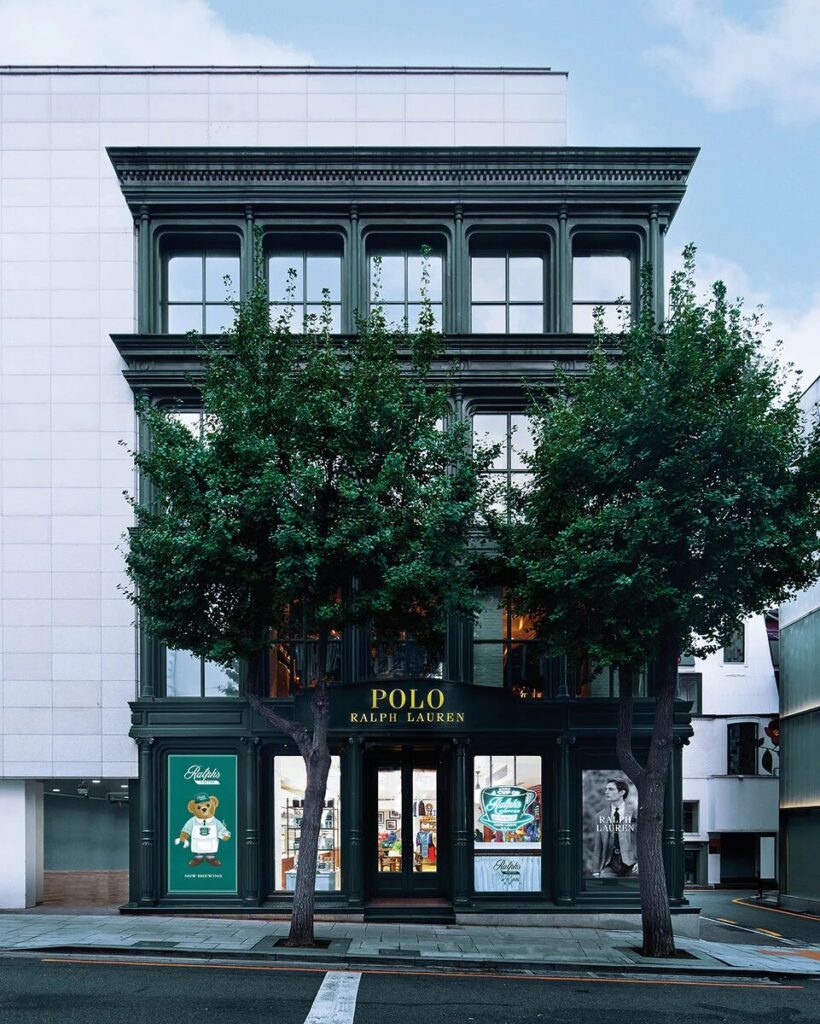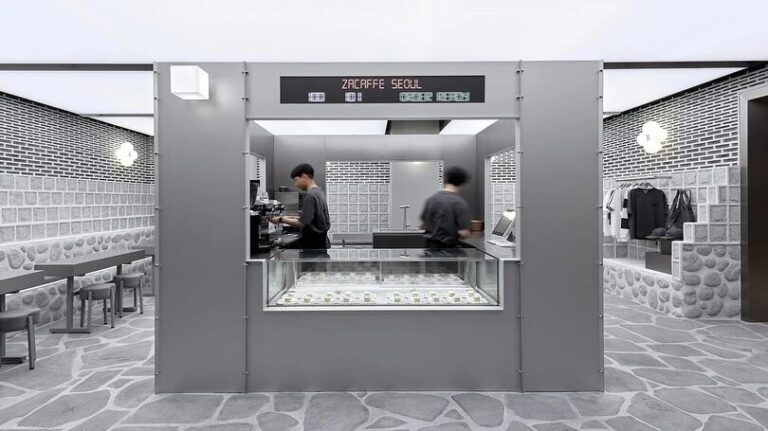Korean cafes have always been vibrant, design-driven, and trend-sensitive—but now, fashion brands are reshaping it entirely. No longer just a place to sip a latte, the Korean cafes are becoming runways of their own, where retail meets espresso and where brands extend their lifestyle narratives beyond clothes and into culture.
From Zara’s newest cafe in Myeongdong to Golden Goose’s hybrid sneaker cafe in Hannam, global fashion houses are embracing the Korean cafes as a strategic extension of their brand. With Seoul’s youth-driven aesthetic, international visitor boom, and cafe-going culture that’s woven into daily life, it’s no wonder brands are stepping into the F&B space.
Here are five standout Korean cafes owned by fashion brands—and why they’ve become destinations in their own right.
1. Zara’s Zacaffe – Fashion Meets Tradition in Myeongdong
Global fast-fashion giant Zara has opened its third-ever cafe worldwide—and it’s right in the heart of Seoul’s retail mecca, Myeongdong. Called Zacaffe, this Korean cafe concept blends minimalist European design with a distinctly Korean twist, featuring an interior inspired by the textures and calm elegance of traditional stone walls, or “doldam.”
Located on the third floor of Zara’s newly expanded flagship store in Noon Square, Zacaffe offers more than just aesthetics. The cafe serves drinks and desserts influenced by Korean tradition, like sujeonggwa lattes and monaka desserts, making it a cultural experience as much as a retail one.
Why it matters: It’s the brand’s first Korean cafe concept and a smart way to connect with MZ (Millennial + Gen Z) customers who prioritize unique, shareable experiences. Zara knows Seoul isn’t just a shopping hub—it’s a lifestyle destination.
2. Golden Goose’s Unique Cafe – Streetwear Meets Seoul Chic
Luxury sneaker label Golden Goose brought its distressed Italian leather to Seoul’s cafe scene with Unique Cafe, a brand space nestled within its flagship store in Hannam. The concept first launched in Thailand and China, but the Seoul location, which opened in July 2023, is already a hotspot.
This Korean cafe doesn’t just serve coffee; it sells a vibe. The decor matches the brand’s distressed, pre-worn aesthetic with concrete walls, neon signage, and premium coffee served with Golden Goose-branded cookies and cups. It’s a space for sneakerheads, creatives, and curious tourists alike.
Why it’s buzzing: More people now come in for the coffee and stay for the shoes. In some cases, the cafe has outperformed the apparel in foot traffic, proving just how powerful Korean cafes can be for brand engagement.

3. Ralph’s Coffee – Timeless Americana in Gangnam
Following its success in cities like New York, Tokyo, and Paris, Ralph Lauren introduced its cult favorite Ralph’s Coffee to Seoul in September 2023. Nestled inside the brand’s Gangnam store, the cafe offers a nostalgic, Ivy League-style escape with forest green interiors, monogrammed cups, and a touch of old-school charm.
Although it feels distinctly American, Ralph’s Coffee adapts to Korean cafes seamlessly, offering seasonal drinks and desserts tailored to local tastes—think matcha milk lattes and hojicha shortbread. It’s elegant, timeless, and Instagram-ready.
What makes it different: Ralph’s Coffee plays into aspirational cafe culture, where a ₩7,000 coffee offers a taste of luxury—even if you’re not buying a suit or handbag. It’s a low-barrier entry point into the world of Ralph Lauren, and Korean customers are lining up for it.
4. KITH Treats – Hype Ice Cream with Celebrity Backing
American lifestyle brand KITH is known for blending fashion with cultural moments—and in Seoul, it’s doing just that with KITH Treats, a dessert-focused Korean cafe within its flagship store in Seongdong. Opened in May 2023, it quickly gained viral traction thanks in part to celebrity fan Jennie from BLACKPINK.
The star item? Cereal-based ice cream cones with outrageous toppings and collectible packaging. At one point, the line for the dessert counter was longer than the checkout line for clothing.
This Korean cafe proves that food can be just as central to a brand as fashion. For Gen Z and young millennials, grabbing an ice cream here is both a treat and a social moment.
Why it’s working: It combines hype culture, limited-edition feel, and flavor—plus, it’s one of the only places you can say your dessert was K-pop approved.
5. UNIQ – Fashion Cafe from Golden Goose, Redefined
Yes, Golden Goose makes the list again—with its UNIQ cafe concept, separate from Unique Cafe, but equally important in Seoul’s fashion F&B ecosystem. This Korean cafe focuses less on retail and more on immersive storytelling, acting almost like a brand museum that serves coffee.
UNIQ cafe incorporates displays of exclusive sneaker models, behind-the-scenes video installations, and limited-edition menu items that change with every campaign. It’s a rotating content hub that keeps people coming back—not just to drink, but to engage.
What sets it apart: It’s part art space, part cafe, and part brand showroom—a true evolution of the Korean cafe format into something more experiential and fluid.
Why Fashion Brands Are Turning to Korean Cafes
The rise of fashion brand cafes in Korea is closely tied to shifts in how people shop, socialize, and engage with brands. With the continued growth of e-commerce, fewer consumers are visiting physical stores purely to make purchases. This has pushed fashion brands to rethink their retail spaces—not as traditional shops, but as lifestyle destinations. These fashion-inspired Korean cafes provide that next-level experience, offering more than just racks of clothes by inviting people to stay, relax, and connect with the brand through all five senses.
Korean cafes also create an organic cultural bridge between global brands and the Korean market. By incorporating local flavors, interior design inspired by Korean aesthetics, and localized menu items, brands can authentically tap into Korea’s deep-rooted cafe culture. This not only appeals to Korean customers but also resonates with tourists who want to experience something uniquely Korean—yet globally familiar.
These spaces are also great for increasing dwell time. When customers come in for a coffee or dessert, they’re more likely to explore the surrounding store, take photos, and engage with the brand in a low-pressure environment. Whether or not they make a purchase, they leave with a memory tied to the brand.
Another key advantage is accessibility. While a luxury handbag or designer outfit might be out of reach for many visitors, a beautifully served latte or dessert isn’t. This lowers the barrier to entry, giving more people a chance to experience a premium brand—even if just for a short coffee break. It’s luxury made approachable, which fits perfectly with the values of younger consumers.
Finally, Korean cafes offer built-in social media buzz. A thoughtfully designed cafe with branded cups, curated menus, and Instagrammable corners generates organic content across platforms like TikTok, Instagram, and YouTube. For brands, it’s free advertising powered by user engagement. In the age of experience-first marketing, that kind of visibility is invaluable.
The Future of the Korean Cafes and Their Fashion Mashup
As e-commerce continues to dominate, physical retail needs to transform into a destination—and in Korea, that means coffee is king. The Korean cafes are no longer just a beverage stop; they’re a lifestyle platform. For fashion brands, creating emotional connections and driving visibility with young, brand-conscious consumers is a low-risk, high-reward strategy.
Expect more labels to jump into the cafe scene in the months ahead, blending curated menus with curated closets. From luxury houses to streetwear newcomers, everyone wants a seat at the cafe table.
Final Sip
Whether you’re here for the matcha, the monaka, or the merch, one thing is clear: the Korean cafes are becoming the new frontier of fashion retail. These fashion-powered cafes don’t just serve drinks—they serve identity, experience, and aspiration. And in a culture that thrives on taste and trend, that’s a winning combo.


